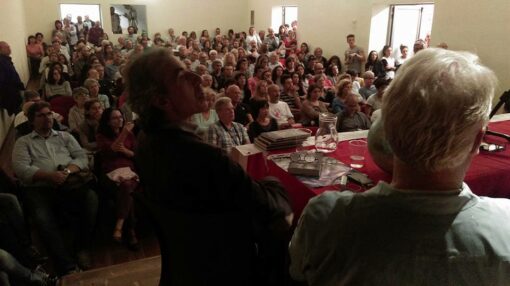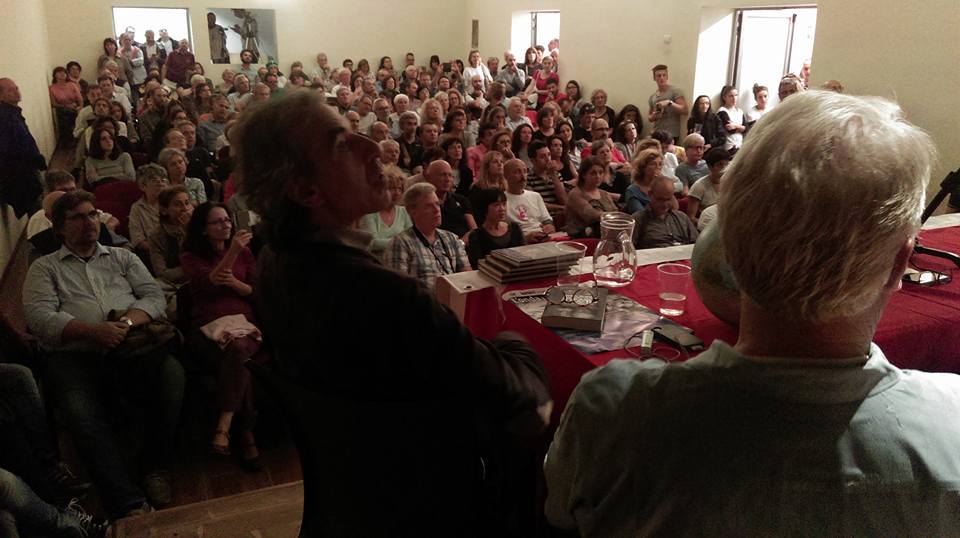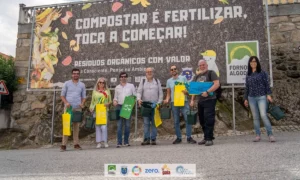
Zero Waste ‘Dream Team’ on Tour

Between the 4th and the 9th of October a team of Zero Waste experts toured the Italian peninsula prior to attending the World Resources Forum in Davos, Switzerland. The “Zero Waste Dream Team” was composed of leading experts in the field of Zero Waste and circular flows of resources.
The “Zero Waste Dream Team”:
-
Captain Charles Moore, Scientist and discoverer of the “Great Pacific Garbage Patch”
-
Dr. Paul Connett, Professor of environmental chemistry, international proponent of the ’10 steps to Zero Waste’ strategy
-
Rick Anthony, President of Zero Waste International Alliance
-
Ruth Abbe, President of Zero Waste USA
-
Tom Wright, Packaging expert and founder of Responsible-Packaging.org
-
Rossano Ercolini, President of Zero Waste Europe
-
Enzo Favoino, Chair of Zero Waste Europe Scientific Committee
This panel offered a unique possibility for the exchange of ideas and sharing of best practices between European Zero Waste efforts and the pioneering efforts taking place in the USA stemming from the state of California, which have now spread across the country all the way to New York City.
The Italian “Zero Waste Dream Team Tour” included talks in a number of different cities across Italy, many of which having particular significance for the issue of zero waste.
In Parma, the administration of the city have taken on a ‘zero waste strategy’ which includes curbside collection, resulting in reduced residual waste effectively reducing the available fuel for the IREN waste-to-energy incinerator.
Florence, a former stronghold of waste incineration, and home of ex-Mayor, and Prime Minister of Italy, Matteo Renzi, also played host to the tour, where they engaged with the regional council on the issue of waste management.
The tour also visited Turin, Vercelli and Rome, before ending in Capannori, the first municipality to adhere to a Zero Waste policy in Europe. Discussions took place in front of lively crowds of students, volunteer organizations, environmental associations, local members of council and actively engaged citizens.
Key messages from the panel included the importance for community responsibility to meet industrial responsibility, allowing for the convergence of both downstream recovery and prevention further upstream. The panel emphasized the characteristic value of the Zero Waste movement as “a politics of yes”, which requires collaboration between local politicians and local activists against incineration and in favour of prevention, re-use, recycling and ultimately re-design.
The audience was able to see how Zero Waste concepts are intricately tied with the notion of the circular economy, advocated for at the European and international level. This emphasised how Zero Waste seeks to emulate nature through cradle to cradle resource flows, and in so doing minimizing environmental impact through a “no burn, no bury, no toxins” policy.
The panel emphasized how Zero Waste does not require technologically complex machines, but better organization, education and industrial design. While the responsibility of industrial designers was called upon to design products for circular resource flows, the key message for the public revolved around the importance of individuals separating materials at source. The Zero Waste Dream Team reiterated throughout their tour how reaching Zero Waste requires only the existing forms of technology, and using our brains and hands in segregating materials. Panellists emphasized how more so than physical infrastructure for Zero Waste, social infrastructure is vital in bringing about culture and behaviour change in the development of new habits.
In this respect, the footage and relics shared by Captain Charles Moore from his many journeys to the North Pacific Subtropical Gyre offered unequivocal evidence of the global impact of waste. His presentation particularly highlighted the importance of the simple gesture of disposing of plastic waste.
“I come to you as an ambassador of an area which has no constituents. I am in a state of desperation. All I can do is measure it and tell you the amount. Represent it. As a scientist I am looking for a political movement that can make something happen. The only political movement I can find to ally myself with is the Zero Waste movement.”
– Captain Charles Moore
Throughout the tour the resonating message has been one of hope yet urgency. There is no “away” to throw our rubbish, no end of life and because there is no end of life there is a next life. Zero Waste is ultimately not the end. It is the beginning. The beginning of the ‘politics of yes’. The question the Zero Waste Dream Team will be taking to Davos at the World Resources Forum will be the same as that of their Italian tour:
“if you’re not for Zero Waste how much waste are you for?”.


